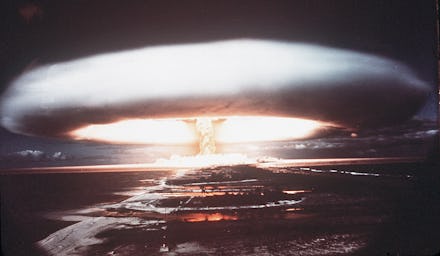The Apocalypse: Here's When Science Says the World Will End

The world didn't end when the Mayans said it would: Dec. 21, 2012 came and went without the long-predicted apocalypse. Which means that we still have that to look forward to. Inquiring minds want to know when; enterprising individuals want to prepare. So when will the world meet its end? When is the apocalypse, not according to some random internet pastor but according to science?
Read more: 12 Years Later, Here's What Happened to the Viral Mastermind Behind "The End of the World"
There's this thing called the Doomsday Clock. Every year, a board of geniuses convenes to determine how it should be reset — sort of like daylight savings, but less predictable and miles more disconcerting. As the Telegraph reported, these knowledgable few declared in January that 2016 puts us as close as we have ever been to midnight on the clock, which is to say, the apocalypse.
According to the Bulletin of the Atomic Scientists, we are currently three minutes to midnight, when we will have "destroy[ed] our civilization with dangerous technologies of our own making." This reckoning takes into account nuclear weapons, climate change, biotechnology and emerging technologies (cyber tech, for example). Since 1945, scientists have been charting our demise with the clock — we haven't been this close to the apocalypse since "the early days of hydrogen bomb testing," the Telegraph reported.
But the Bulletin of Atomic Scientists isn't the only group speculating on when, precisely, the world will end. Researchers at Oxford University's Future of Humanity Institute teamed up with the Global Challenges Foundation and released a report in 2015 that listed 12 potential death blows that civilization could be dealt. There's not a time stamp on any of them, but one can weigh the purported risks against our current global situations to get an idea of appropriate apocalypse stress level.
According to the report, the clear and present dangers break down into four categories. When it comes to "current risks," there's "extreme climate change," "nuclear war," "ecological catastrophe," "global pandemic" and "global system collapse" to dread. "Exogenic risks" include "major asteroid impact" and "supervolcano." Emerging risks are "synthetic biology," "nanotechnology," "artificial intelligence" and the ambiguous "uncertain risks." There's just one "global policy risk," and it is "future bad global governance."
One might think about ebola, or our rising global temperatures, or all the nukes in the hands of all the countries, or the smorgasbord of A.I. technologies or the incredibly realistic synthetic skin we're now growing in labs and start to feel a little queasy. One might ruminate on the improbable rise of a reality television star/billionaire to the position of Republican frontrunner for U.S. presidency and feel compelled to start building the bunker now.
But science can't really say how or when the world will end, at least, not at present. Who knows? Maybe it'll be death by zombie for all of us. Or, the earth will hang in there for another 6 billion years before it's cannibalized by our dying sun. Outlook: hazy.
Correction: April 7, 2016